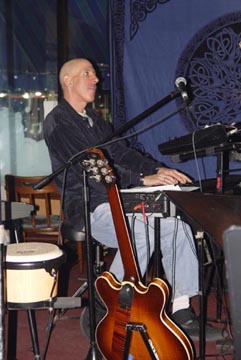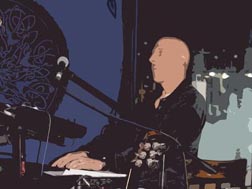|
Inquiring into Ben's early childhood and exposure to music causes him to recall, "I remember listening to my mother play the piano. She used to have a flutist come over and they would play duets. I was really impressed. For some reason it just really drew me in. I was maybe three or four years old then."
Ben's earliest recollection of making music himself was "When we used to sing in elementary school and teachers just singing songs. Probably other stuff too. Or maybe it's where you take mallets and bang on stuff. That really appeals to kids, especially boys.
"I was in violin class when I was in third grade. And I distinctly remember that I was the worst one in class, which for violin is really painful.
"I started playing the piano about eighth grade. However, I'd started playing trumpet in the seventh grade in my high school band. One of my best friends literally dragged me down to the class. I didn't want to go. But he just wanted me in the class 'cause he was taking it.
"So I had already learned how to read treble clef. Then I was trying to learn how to read bass clef, and of course read treble clef and bass clef at the same time. So I was trying to teach myself and I was getting really, really frustrated with it. And finally my mother said, 'why don't you go take lessons.' "
Ben Flint was born in the Atlanta, Georgia, area and was influenced by the vibrant Memphis music scene very early in life but was exposed to Jazz as well. He recalls when he was a teenager his introduction to pianist James Williams.
"My mom sent me to a Jamey Aebersold camp. Jamey Aebersold was one of the first guys to decide to make a business out of Jazz education. It was a summer camp and I met James Williams there. James Williams started calling me 'cause he was from Memphis. And he would come to Memphis all the time. And they would arrange a little gig and the whole town would come out."
Ben talks about James's influence on him. "Playing wise, James Williams had a rhythmic approach that I always try to recreate. A real dancing kind of feel. It really sounds like someone dancing. I always try to get that feeling in. The chords he played had really wide voicings all the time. I really try to widen up my voicings when I try to play like James. Spread 'em out further."
Ben's most notable gig has been years of playing piano for Isaac Hayes, and he tell us how that came about. "It was at the Apollo. I had heard from the lighting guy that he was looking for a new piano player. So I kept calling and kept calling for three months and finally they said let's go. They called and said we're going to Australia in a week." That led to a fourteen-year gig."
This was a real learning experience. "I really learned how to lay back and dig into the groove. It was like I was on an aircraft carrier and the pilot was saying, 'we are going this fast and there is nothing you can do about it.' So I really learned how to root down and find a real laid-down way of playing soul and funk."
Ben tells another anecdote. "We were playing Dallas. And there were all these wigs backstage. So I put a big afro wig under my vest. And had it there until the last song, which of course is 'Shaft.' The song starts real slow so I ducked under the keyboard and put it on. And when Isaac saw me he fell out. And one by one the rest of the band turned, and when they saw me they all fell out, even the drummer. Later someone came up to me and said that it was really great to see a band really having fun up there."
Having just left Isaac Hayes, Ben is now on his own. "Well, obviously it's really great to get your own music out there. It's great to have a direct connection to the audience. I feel like I am using much more of me."
During Ben Flint's trip down the music road he has met, played with, and collaborated with many other musicians. He met Gerard Harris when he was in high school. Harris was a few years older and was already teaching. Ben remembers, "His music and his personality are so warm. I've always tried to emulate that. I even stole the way he plays piano, and he's really a guitarist.
"We really work together well, like Duke and Billy. He'll start something and I'll complete it or vice versa. He's completely honest-will tear your song apart in a heartbeat. But he also knows how to leave the meat of the idea and change the packaging. He's always adding percussion or some sound effect that totally changes the feel of something. It's really brilliant how he frames the ideas. And we like a lot of the same music, which helps. I've been listening to and playing his songs for twenty-five years.
"One of the other musicians on the World Soul Project is Barry Campbell, another great talent we're lucky to have. I've known him since high school, and he was the black Jaco of Memphis. He left for New York and had a great run, playing in the band for Live at the Apollo and playing for Roberta Flack, and Ashford and Simpson.
 |
"I turned on the TV one night and there he was playing in David Bowie's band on the David Letterman Show. Then he left New York and returned to Memphis. And he only lives a few blocks from Gerard's house. So we got him on the project, and he contributed also as a composer."
Ben's pride in this new album is "that it's a cohesive sound that is featuring different elements of the African Diaspora. African sounds have influenced music all over the Western continent. From America we get Cajun music, blues and Jazz. From the Caribbean, salsa, calypso and merengue. From Brazil bossa, samba, and more. All are African music once removed."
To promote the new album Ben says "We are doing spot dates. We had a CD release party in Memphis, and we are going to have one in the Bay Area and Santa Cruz."
When asked how he sees music's relevance for today, Ben replies, "Music is sort of a meditation in itself, whether you are making it or listening to it. To really experience it you have to be in the present moment."
Ben Flint's academic credentials are impressive and have provided him with the necessary tools to perform and teach. He speaks of that journey. "Right after I graduated from USC with a masters, I started teaching some piano-just private piano-and also I was doing a church choir. Then I moved up here and started teaching at SF State, doing the Jazz choir there. And then at Santa Rosa Junior, for three and a half years. Doing my own arrangements and teaching them.
"'Course, at the same time I was learning how to teach, particularly how to teach vocals, 'cause I wasn't much of a singer at that point. So that was a big challenge. And then I came down to Laney College and taught piano and Jazz combo for a couple of years. And then, through Bill Bell I started teaching Jazz History at the College of Alameda for three years.
"All of these courses have taught me an awful lot. Currently I'm doing Vista Community College, also a Jazz History course. Starting to include different things, like spirituals and different histories. That course has been the most interesting course, I think, 'cause it just really covers so much ground. And it makes clear to me how important is the oral tradition of African culture, which has been going back for thousands of years, and is so strong that it's really strong today. Even in this day and age of technology, the internet and computers, it's still going very strong within the churches and hip-hop community.
"As the teacher you often feel like you are learning more than the students. Also, you really have to check what you know and put it into bite-size ideas and put it in a chronology that people can understand. You have to re-analyze everything you know and can do well. It's a whole other way of understanding, and of course the more times you visit something the deeper you understand it."
Going forward, Ben wants to work at "defining myself more as an artist. I'm already somewhat established as a teacher and a local artist. As a side man, really. I'm doing well as a side man. I would like to see myself become more known as a composer and as a front person- a more complete artist. That would be gratifying. Even if it's not, I'm kind of understanding that, you know.
"We work really hard on these CD concerts, and you're pretty happy if you can break even and pay the band. But what you're getting is you're really defining yourself in a much deeper way to the public. And it may not have an immediate financial reward-it may not have any financial rewards. But your reward is you are able to share your creations with a broader audience."
Ben's at a beautiful place, and there's a beautiful sentence to end the interview.
Ben Flint
World Soul Project
One Truth Music OTM1602-2
This energetic new CD is anchored by long-term friends and musical collaborators, pianist Ben Flint and guitarist Gerard Harris. It is dedicated to pianist James Williams (1951-2004) who mentored both of them. It also represents a collaboration of musicians from Memphis, Tennessee, and the Bay Area. It is rhythmically diverse and harmonically sophisticated and introduces some lovely new melodies by the players and some guest artists.
"Someday" leads it off, a simple melody by Harris with an Afro- Cuban tumbao feel. Brazilian vocalist Patricia Reis sweetly sings her own Portuguese lyrics. It's upbeat, a nice beginning.
"Kinsasha," by Flint, follows it well with a lilting African feel in 12/8 time. It's joyous, with some pensive undertones.
"In Your Eyes" could be a hit single. It's a tour de force for soul singer/lyricist Will Graves, whose smooth, insinuating vocals weave in and around the solid rhythmic support of guest pianist/composer Stacy Wade and the band.
"Intrigue" by Flint in 7/8 time, has a propulsive and circular quality. Harmonically ethereal, it has exciting dynamics and syncopation and is supported by guest drummer Darian Gray and guest bassist Dan Parenti.
"Love Divine" has a searing, evocative melody written by Flint and ramped up higher by vocalist/lyricist Kimiko Joy. She sings with tenderness and conviction. Beautiful interplay between her, Flint, Harris, Gray, and Parenti.
"Night Moods" by Campbell features tasty solos by Harris and Flint and funky, brassy lines from Campbell. Combining arranged and spontaneous elements, it's a nicely realized piece.
"Esperando," by Flint, is a sweet, heartful tune with a Brazilian feel. Very accessible melodically, it might be my favorite. Reis wrote a lovely Portuguese lyric, very Brazilian in its gentle irony. She sings it tunefully in an understated manner. Guest vocalist Adriano Faquini energizes this piece, bringing passion and a sampling of vocal colorings to his interpretation. I loved the Ekpe and the talking drums, barking syncopated commentary between the lines.
"Someday" is reprised at the end of the CD, with vocalist Graves singing Harris's English lyric. He's a compelling vocalist. I enjoyed this version as well.
Including another five selections for a total of over sixty minutes, this is a generous CD. Eminently listenable, it gets better with each playing.
Recommended.
 Ben Flint
Ben Flint